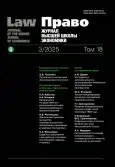Устные международные договоры в российской правовой системе
- Авторы: Ромашев Ю.1
-
Учреждения:
- Национальный исследовательский университет «Высшая школа экономики»
- Выпуск: Том 18, № 3 (2025)
- Страницы: 181-204
- Раздел: Право в современном мире
- URL: https://journal-vniispk.ru/2072-8166/article/view/318087
- DOI: https://doi.org/10.17323/2072-8166.2025.3.181.204
- ID: 318087
Цитировать
Полный текст
Аннотация
Важное значение для правового регулирования межгосударственных отношений имеют устные международные договоры. Практика их заключения имеет давнюю историю. Вместе с тем в науке исследованию этого уникального источника международного права уделяется незаслуженно мало внимания (по сравнению с письменными международными договорами). Это накладывает отпечаток на практику использования устных международных договоров, в том числе и на изучение этих вопросов в высших учебных заведениях. В науке международного права недостаточное внимание уделяется также уяснению места устных международных договоров в российской правовой системе, а также оценке возможности их использования в российской практике межгосударственных отношений. Чтобы восполнить этот пробел, в настоящей работе с позиций диалектического подхода и использования общенаучных и специально-юридических методов исследования произведена попытка раскрыть этот вопрос. Показано, какое место занимают устные международные договоры в современном международном праве. Приводятся примеры устных международных договоров в практике российского государства. Раскрыты вопросы правопреемства в отношении ранее заключенных устных международных договоров. Произведена оценка возможности использования устных договоров в российской правовой системе применительно к положениям Конституции России. Выдвинуты предложения по совершенствованию российского законодательства, позволяющие более плодотворно осуществлять международную правотворческую деятельность, используя в необходимых ситуациях устные международные договоры. Показано, что несмотря на то, что в российском законодательстве отсутствуют нормы, посвященные устным международным договорам, Россия имеет неотъемлемое право на их заключение. Данное право, как и существование устной формы международных договоров, основывается на общепризнанных принципах и нормах международного права, подтверждено в международных договорах, участником которых является Российская Федерация. Отмечено, что порядок заключения, действия, изменения и прекращения устных международных договоров пока регулируется нормами международных обычаев и общими принципами права, большинство которых применимо и к письменным международным договорам.
Об авторах
Юрий Ромашев
Национальный исследовательский университет «Высшая школа экономики»
Автор, ответственный за переписку.
Email: romashev-yus@mail.ru
ORCID iD: 0000-0002-9059-584X
Доктор юридических наук, профессор. Доктор юридических наук, профессор.
Россия 101000, Москва, Мясницкая ул., 20.Список литературы
- Butkevich O.V. (2008) At the Origins of International Law. Saint Petersburg: Yuridicheskii center press, 881 p. (in Russ.)
- Chernichenko S.V. (2014) Contours of international law. Moscow: Nauchnaya kniga, 592 p. (in Russ.)
- Dörr O., Schmalenbach K. (2012) Vienna Convention on the Law of Treaties. A Commentary. Berlin — Heidelberg: Springer, 1423 p.
- Getman-Pavlova I.V., Postnikova E.V. (2019) International Law. Moscow: Yurait, 560 p. (in Russ.)
- International law: textbook (1951) E.A. Korovin (ed.) Moscow: Gosudarstvennoe izdatelstvo yuridicheskoi literatury, 600 p. (in Russ.)
- International law: textbook (2023) A.A. Danelyan, S.A. Egorov (eds.). Moscow: Prospekt, 752 p. (in Russ.)
- Kozhevnikov F.I. (1947) Russian State and International Law (before the 20th Century). Moscow: Yuridicheskoe izdatelstvo, 336 p. (in Russ.)
- Li Haopei (1987) An Introduction to the Law of Treaties. Beiping: Law Press of China, 286 p.
- Lihachev D.S. (1947) Russian Chronicles and their Cultural and Historical Significance. Moscow — Leningrad: Academy of Sciences, 499 p. (in Russ.)
- Lipson Ch. (1991) Why are Some International Agreements Informal? International Organization, vol. 45, no. 4, pp. 495–538.
- Lukashuk I.I. (2004) Modern law of international treaties. Conclusion of international treaties. Vol. 1. Moscow: Wolters Kluwer, 658 p. (in Russ.)
- Martens F.F. (1996) Modern international law of civilized peoples. Moscow: University Press, 313 p. (in Russ.)
- Naumkin V.V. et al. (2010) SSSR and the Eastern states on the Eve and in period of the Second World War. Moscow: Nauka, 460 p. (in Russ.)
- Qin Xiaocheng (2005) Oral International Agreement and China’s Relevant Practice. Chinese Journal of International Law, vol. 4, issue 2, pp. 465–480.
- Talalaev A.N. (1963) Legal Nature of an International Treaty. Moscow: MGIMO, 264 p. (in Russ.)
- Talalaev A.N. (1997) Vienna Convention on the Law of Treaties. Commentary. Moscow: Yurid. lit., 334 p. (in Russ.)
- Ullmann E. (1908) Völkerrecht. Tübingen: Mohr, VIII, 555 p.
Дополнительные файлы








